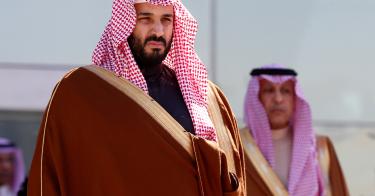Under the leadership of Crown Prince Mohammed bin Salman, Saudi Arabia has launched a crackdown on corruption. This is the world’s third great anti-corruption drive in the past 15 years. The last two, in Russia and China, presaged war and aggression. The same things will happen in the Middle East.
The conventional wisdom about the Saudi crackdown is that it reflects the decline in the price of oil. The Saudis need to prepare for a world in which U.S. fracking — not Saudi pumps — shapes the market, and hence the Saudi budget.
Bluntly put, Saudi Arabia needs to start to work for a living. But it can’t do that without a market-based economy, and corruption is the enemy of business opportunity.
This conventional wisdom isn’t wrong. But it’s only part of the story. To see the rest of it, look at Russia and China. Back in 2000, Vladimir Putin launched a campaign against Russia’s oligarchs, condemning them as corrupt. That was no more than the truth.
But the point of Putin’s campaign was not to end corruption. Today, Russia is one of the most corrupt nations in the world. Instead, Putin sought to centralize Russia’s corruption, and the power it brings, in the Kremlin.
He wanted to secure his own rule. But he also wanted to use his power to reassert Russia’s status as a great power by invading the nation of Georgia, annexing Crimea, attacking Ukraine, and causing trouble around the world. Much the same is true in China. In 2012, newly elevated Chinese President Xi Jinping launched an anti-corruption campaign. This is a nice name for what was a purge of hundreds of thousands of officials, including many of Xi’s potential opponents.
Again, the campaign was not to end corruption. It was to centralize power, and control over corruption, in Beijing, to secure Xi’s rule and that of the Chinese Communist Party.
This was not merely about making China safe for Xi. It was about creating a regime that could assert power in the region and beyond. Since 2012, China has become more aggressive in the South China Sea, and launched its One Belt, One Road initiative across Eurasia.
The bottom line is that when big, autocratic countries launch anti-corruption drives, the target isn’t really corruption. The target is power, the aim is to control it, and the intent is to use that power to secure the regime and allow it to assert itself in the region.
And that is what is happening in Saudi Arabia. The Saudis don’t simply fear fracking. They are worried about the rise of Iran and of the Shia. The Saudi regime recently has picked fights with Qatar and Lebanon — both of which it sees as part of its struggle with Iran.
Why is this happening now? Because ever since the Iranian Revolution of 1979, the United States had the Saudis’ back. The Saudis didn’t need to buy their own insurance policy: They had an American one. But under President Barack Obama, that policy was torn up. In 2016, White House adviser Ben Rhodes voiced contempt for those who “whine incessantly about the collapse of the American security order in Europe and the Middle East.”
Far from seeking to uphold that order against Iran, Obama wanted to do a deal with Iran and to let it become a regional power. That’s what happened. For all his combative rhetoric, President Donald Trump has done little to roll back Iran.
The Saudis are buying their own insurance policy by centralizing power so their regime can build a domestic base for a regional war. Right now, that war is a cold one, fought by proxies in the Middle East. But if it turns hot, it will be a war that was partly made in Washington.
This piece originally appeared in Newsday



